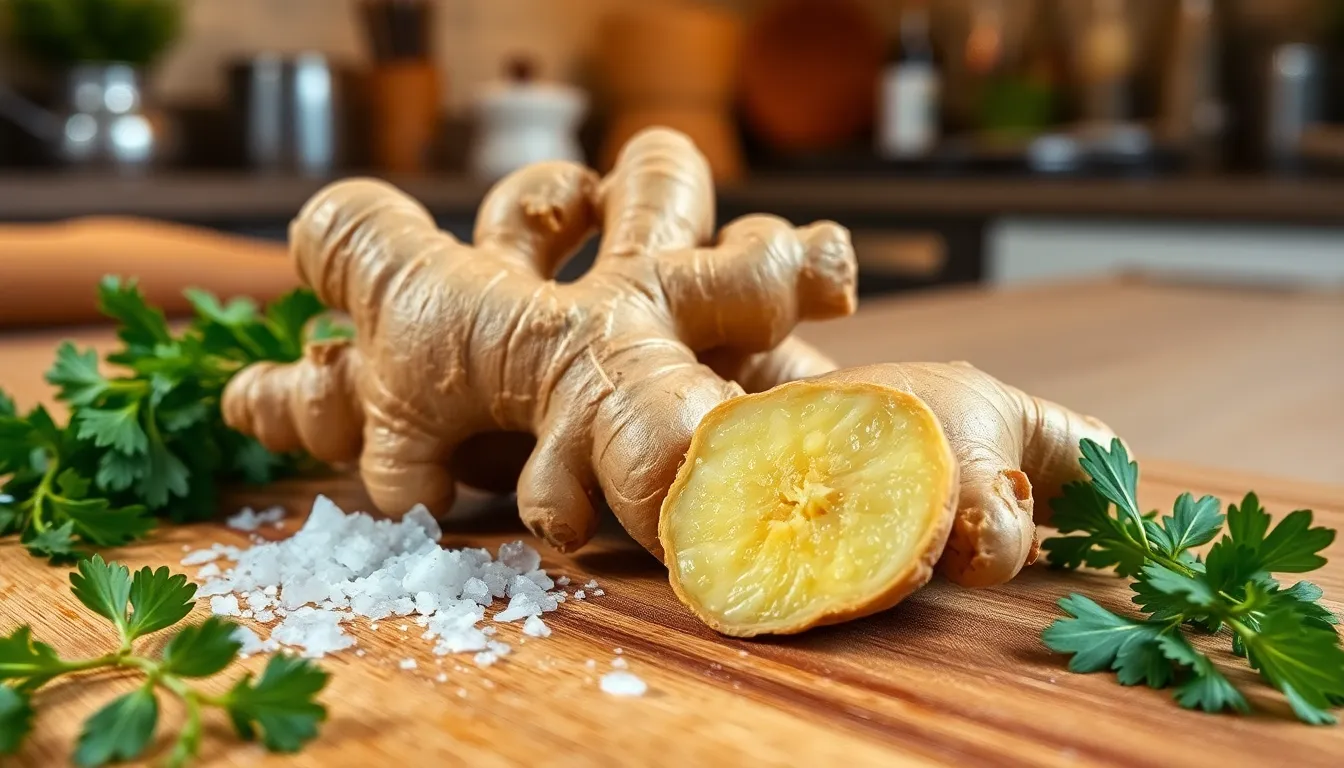Table of Contents
ToggleGinger has long been celebrated for its culinary and medicinal properties, but can it really help lower blood pressure? As more people seek natural remedies for health issues, the spotlight has turned to this spicy root. Research suggests that ginger may have potential benefits for cardiovascular health, sparking interest among those looking to manage hypertension without relying solely on medication.
With its anti-inflammatory and antioxidant properties, ginger could play a role in promoting better blood circulation and reducing blood pressure levels. But how effective is it really? This article delves into the science behind ginger and its impact on blood pressure, exploring whether incorporating this versatile ingredient into one’s diet can lead to tangible health improvements.
Overview of Blood Pressure
Blood pressure refers to the force of blood against the walls of arteries. It consists of two measurements: systolic pressure (the force during heartbeats) and diastolic pressure (the force when the heart rests between beats). Blood pressure is measured in millimeters of mercury (mm Hg) and is recorded as two numbers, such as 120/80 mm Hg.
Blood pressure categories include:
- Normal: Below 120/80 mm Hg
- Elevated: Systolic between 120-129 and diastolic below 80
- Hypertension Stage 1: Systolic between 130-139 or diastolic between 80-89
- Hypertension Stage 2: Systolic 140 or higher or diastolic 90 or higher
- Hypertensive Crisis: Systolic over 180 and/or diastolic over 120
Hypertension affects approximately 45% of adults in the United States, increasing risks for heart disease and stroke. Factors contributing to high blood pressure include age, obesity, diet, and lack of physical activity.
Monitoring blood pressure regularly is vital. Lifestyle changes such as a balanced diet, regular exercise, and stress management play critical roles in maintaining optimal blood pressure levels.
The Role of Diet in Blood Pressure Management

Diet plays a crucial role in managing blood pressure levels. Incorporating specific foods can promote heart health and potentially lower hypertension.
Importance of Natural Remedies
Natural remedies offer holistic approaches to managing blood pressure. Many individuals prefer these over pharmaceuticals due to fewer side effects. Ginger, with its anti-inflammatory properties, shows promise in improving vascular health. Research indicates that other herbs and spices, like garlic and turmeric, also contribute positively to blood pressure regulation, offering additional options for dietary inclusion.
Common Dietary Ingredients
Several dietary ingredients can influence blood pressure management:
- Leafy greens: Spinach, kale, and Swiss chard are high in potassium, which helps regulate sodium levels.
- Berries: Blueberries and strawberries contain antioxidants called flavonoids that may aid in lowering blood pressure.
- Beets: These root vegetables are rich in nitrates, which improve blood vessel function and may decrease blood pressure.
- Oats: Whole grain oats provide soluble fiber, promoting heart health and better blood pressure readings.
- Bananas: These fruits are excellent sources of potassium and help maintain healthy blood pressure levels.
Incorporating these foods into daily meals can enhance cardiovascular health and support effective blood pressure management.
Ginger: Nutritional Profile and Benefits
Ginger contains various compounds that contribute to its potential health benefits, particularly regarding blood pressure management. Understanding these active components and their historical uses provides insight into ginger’s role in promoting cardiovascular health.
Active Compounds in Ginger
Ginger’s health benefits come from several active compounds, primarily gingerol, shogaol, and zingerone.
- Gingerol: This compound exhibits strong anti-inflammatory and antioxidant properties, which may help reduce oxidative stress and inflammation in the cardiovascular system.
- Shogaol: This derivative of gingerol has been shown to improve blood circulation and may act as a vasodilator, potentially aiding in lowering blood pressure.
- Zingerone: This compound contributes to ginger’s flavor and possesses antioxidant effects, which may help protect the heart and regulate blood pressure.
Research indicates that these compounds can positively affect blood pressure and heart health, making ginger a valuable addition to a diet aimed at managing hypertension.
Historical Uses of Ginger
Ginger has a long history of use in traditional medicine across various cultures.
- Traditional Chinese Medicine: Ginger has been utilized for over 2,000 years to treat digestive disorders and respiratory issues.
- Ayurvedic Medicine: In India, ginger has served as a natural remedy for nausea, digestive problems, and inflammation.
- Other Cultural Uses: Various cultures recognized ginger’s potential to alleviate symptoms of colds and flu, contributing to overall wellness.
These historical applications underscore ginger’s reputation as a natural remedy for health-related issues, including cardiovascular concerns.
Scientific Evidence on Ginger and Blood Pressure
Numerous studies support the potential blood pressure-lowering effects of ginger, linking its active compounds to improved cardiovascular health. This section details recent findings and the mechanisms behind ginger’s benefits.
Recent Studies and Findings
Research has demonstrated ginger’s effectiveness in lowering blood pressure in various settings. A 2019 meta-analysis reviewed multiple studies and indicated that ginger consumption can significantly reduce systolic and diastolic blood pressure levels. For example, one clinical trial involving hypertensive participants showed a reduction of 5-10 mm Hg in systolic pressure after consistent ginger supplementation over several weeks. Another study highlighted that daily intake of ginger powder resulted in a notable decrease in blood pressure readings among participants with elevated levels. These findings underline the positive impact of ginger on blood pressure management and cardiovascular health.
Mechanisms of Action
Ginger exerts its blood pressure-lowering effects through several mechanisms:
- Anti-inflammatory properties: Ginger contains gingerol and other compounds that reduce inflammation, which plays a vital role in hypertension. Lower inflammation levels can enhance blood vessel function and reduce arterial stiffness.
- Vasodilation: Shogaol, another active compound, promotes vasodilation, the widening of blood vessels. This process improves blood flow and helps maintain lower blood pressure levels by decreasing resistance in the circulatory system.
- Antioxidant effects: Ginger’s antioxidant properties help combat oxidative stress, which contributes to high blood pressure. By neutralizing free radicals, ginger aids in protecting blood vessels and promoting heart health.
These mechanisms collectively position ginger as a beneficial addition to a heart-healthy diet aimed at managing blood pressure.
How to Incorporate Ginger into Your Diet
Adding ginger to daily meals enhances flavor and provides health benefits. Simple methods exist for incorporating this root into a variety of dishes.
Delicious Recipes with Ginger
- Ginger Tea: Boil water and add fresh ginger slices, steeping for 10-15 minutes. Add lemon or honey for added flavor.
- Stir-Fry: Incorporate grated ginger into vegetable or protein stir-fries. It adds a spicy kick and complements sautéed greens and protein sources like chicken or tofu.
- Smoothies: Blend ginger with fruits like bananas or apples, spinach, and a protein of choice to create a nutrient-rich smoothie.
- Soups: Add minced ginger to soups, particularly Asian-inspired recipes like miso or coconut curry, enhancing both taste and health benefits.
- Baking: Use ground ginger in baked goods, such as gingerbread or muffins, balancing sweetness with its spicy undertone.
Recommended Dosages
- Fresh Ginger: Consuming 1-2 grams of fresh ginger daily may yield health benefits. This translates to about one tablespoon of grated ginger.
- Dried Ginger: For powdered ginger, 1-2 grams daily is effective, roughly equal to a quarter to half a teaspoon.
- Ginger Tea: Drinking 2-3 cups of ginger tea daily can provide a steady intake of ginger’s beneficial properties.
- Ginger Supplements: If opting for supplements, dosages of up to 500 mg, taken two to three times daily, align with safety and efficacy standards.
Regularly integrating these recipes and maintaining recommended dosages can help maximize ginger’s blood pressure-lowering potential and overall health benefits.
Potential Risks and Considerations
While ginger offers potential health benefits, certain risks and considerations exist regarding its use, particularly for individuals with specific health conditions or those taking medications.
Interactions with Medications
Ginger can interfere with several medications, affecting their efficacy. It may enhance the blood-thinning effects of anticoagulants, such as warfarin and aspirin, raising the risk of bleeding. It also interacts with blood pressure medications, possibly causing hypotension if combined with other antihypertensives. Individuals on diabetes medications should monitor their blood sugar levels, as ginger might lower glucose levels, leading to hypoglycemia. Consulting with a healthcare provider is essential before introducing ginger, especially for those on medication.
Possible Side Effects
Ginger may cause side effects in some individuals. Common effects include gastrointestinal issues such as heartburn, diarrhea, and stomach upset. Allergic reactions, though rare, can occur, presenting as skin rashes or itching. High doses of ginger may lead to complications such as increased bleeding, particularly during surgical procedures. Pregnant or breastfeeding women should approach ginger cautiously, as excessive intake might lead to adverse effects for both mother and child. Regular monitoring of intake helps mitigate these risks.
Ginger emerges as a promising natural remedy for managing blood pressure. Its rich nutritional profile and active compounds contribute to its potential benefits for cardiovascular health. Through its anti-inflammatory and antioxidant properties ginger may support improved blood circulation and overall heart function.
While scientific studies suggest significant reductions in blood pressure levels with regular ginger consumption it’s essential for individuals to approach its use thoughtfully. Consulting with healthcare professionals ensures that ginger can be safely integrated into a diet without adverse interactions with medications.
Incorporating ginger into daily meals can be both delicious and beneficial. By doing so individuals may take a proactive step towards maintaining healthy blood pressure levels and enhancing their overall well-being.




